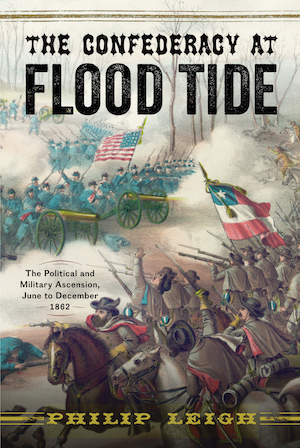(October 18, 2022) When Lee and Jackson first collaborated during the Peninsula Campaign in late June of 1862, Jackson was the more accomplished commander. He had earned his “Stonewall” moniker at First Manassas and augmented it with his superb Shenandoah Valley Campaign in May and early June of 1862. Lee, by comparison, had no similar accomplishments. Consequently, the public tended to have more confidence in Jackson than in Lee, who was derided as “The King of Spades” for building entrenchments around Richmond after taking command of the army defending the capital from the wounded General Joe Johnston on June 1, 1862.
In the edited excerpt below Douglas Southall Freeman explains how one congressman urged that Jackson be allocated additional resources.
Congressman and Colonel A. R. Boteler, the unofficial envoy of Jackson’s Army of the Valley, arrived at Lee’s headquarters 14 June with a confidential message from Jackson requesting that Lee bring up Jackson’s strength to 40,000 men so that he could invade the North. Lee discussed it with Boteler.
“Colonel,” he said, “don’t you think General Jackson had better come down here first and help me to drive these troublesome people away from Richmond?”
“Well, if I answer your question at all,” said Boteler, “it must be in the negative.”
“Why so?” inquired Lee.
“Because,” Boteler explained, “if you bring our valley boys down here at this season among the pestilential swamps the change from their pure mountain air to the miasmatic atmosphere will kill them off faster than the Federals had been doing.”
“That,” said Lee, “will depend upon the time they’d have to stay here. Have you any other reason to offer?”
“Yes,” Boteler rejoined stoutly, “and it’s that Jackson has been doing so well with an independent command that it seems a pity not to let him have his own way; and then, too, bringing him here, General, will be — to use a homely phrase — putting all your eggs in one basket.”
“I see,” Lee said with a kindly laugh, “that you appreciate General Jackson as highly as I myself do, and it is because of my appreciation of him that I wish to have him here.”
*
Jackson’s disappointing performance during the Peninsula Campaign is well known. Nevertheless, as he witnessed Lee’s seven days of relentless attacks that drove the enemy from Richmond, leaving them cowed at Harrison’s Landing 25 miles away, he could see that Lee’s aggressiveness was like his. As a result, he developed a respect for Lee that might have been only incipient before.
Freeman writes of an incident at Jackson’s HQ shortly after Lee’s final assaults on McClellan at Malvern Hill, which was the last battle of the campaign on 1 July.
At the first opportunity, Jackson sought out Colonel A. R. Boteler, who was a member of Congress as well as an acting member of his staff.
“Do you know that we are losing valuable time here?” Jackson began.
“How so?” Boteler replied.
“Why, by repeating the blunder we made after the battle of Manassas, in allowing the enemy leisure to recover from his defeat.”
He then explained that as McClellan was beaten, he would have to reorganize and reinforce his army before it would be in fighting trim, and that this assured the safety of Richmond. Advantage should be taken of this to invade the North. He wanted Boteler to go forthwith to see the President, to urge this course on him.
“What is the use of my going to Mr. Davis,” Boteler asked, “as he’ll probably refer me again to General Lee? So why don’t you yourself speak to General Lee upon the subject?”
p261 “I have already done so,” Jackson said.
“Well, what does he say?”
“He says nothing.” And then he added carefully, “Don’t think I complain of his silence; he doubtless has good reason for it.”
“Then,” Boteler inquired, half-curiously, “you don’t think that General Lee is slow in making up his mind?”
“Slow!” exclaimed Jackson with much energy. “By no means, Colonel! On the contrary his perception is as quick and unerring as his judgment is infallible. But with the vast responsibilities now resting on him, he is perfectly right in withholding a hasty expression of his opinions and purposes.”
He paused for a moment and then he said: “So great is my confidence in General Lee that I am willing to follow him blindfolded. But I fear he is unable to give me a definite answer now because of influences at Richmond, where, perhaps, the matter has been mentioned by him and may be under consideration. I, therefore, want you to see the President and urge the importance of prompt action.”
Boteler duly called on Mr. Davis and stated Jackson’s views.
On 13 July Lee ordered Jackson and Ewell to proceed to Gordonsville, sixty-seven miles northwest of Richmond. The movement was not to invade the North but to meet the threat of Union General John Pope’s army approaching Lee’s rear from northern Virginia.

